My News and Reviews
I was on vacation for most of last week so I wasn’t around online much, but I did still mange to get a couple of reviews posted. I reviewed Kozue Amano’s Aqua, Volume 1 for the Aria Manga Moveable Feast. Amano’s artwork is lovely, and the story is relaxing. The second review was for Yokai Attack!: The Japanese Monster Survival Guide written by Hiroko Yoda and Matt Alt and illustrated by Tatsuya Morino. It’s a fantastic and colorful introduction to traditional Japanese creepy crawlies and supernatural creatures.
And as for other fun stuff online: Jason Thompson’s House of a 1000 Manga recently featured Hinako Takanaga, one of his favorite boys’ love mangaka (who also happens to be one of my favorites as well). On a related note, Jennifer LeBlanc of The Yaoi Review has finished posting her three part interview with Takanaga (Part 1, Part 2, Part 3).
Since I read both Sundome and Peepo Choo this past week, I’d also like to draw your attention to a couple episodes of Ed Sizemore’s Manga Out Loud podcasts featuring the series: Sundome with Melinda Beasi of Manga Bookshelf and Peepo Choo w/ Erica Friedman, David Welsh, & Melinda Beasi. I really enjoy Manga Out Loud—it’s nice to see (well, hear) such candid conversations about manga, especially regarding potentially controversial series and materials.
Quick Takes
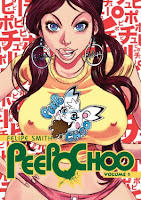 Peepo Choo, Volumes 1-3 by Felipe Smith. Take a few stereotypes to the extreme, add more than enough graphic violence and sex, and finish off by including a few stunningly over-the-top characters, and you might get close to understanding the mind-blowing insanity that is Peepo Choo. It’s not a type of insanity that everyone will be able to appreciate. The story, especially towards the beginning of the series, frequently comes across as cruel and there’s plenty of material at which to take offense. But Smith’s tough-love approach plays out nicely by the end. There’s not necessarily anything wrong with being a walking embodiment of a stereotype if that’s what someone wants to be.
Peepo Choo, Volumes 1-3 by Felipe Smith. Take a few stereotypes to the extreme, add more than enough graphic violence and sex, and finish off by including a few stunningly over-the-top characters, and you might get close to understanding the mind-blowing insanity that is Peepo Choo. It’s not a type of insanity that everyone will be able to appreciate. The story, especially towards the beginning of the series, frequently comes across as cruel and there’s plenty of material at which to take offense. But Smith’s tough-love approach plays out nicely by the end. There’s not necessarily anything wrong with being a walking embodiment of a stereotype if that’s what someone wants to be.
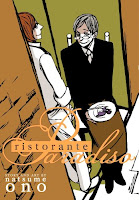 Ristorante Paradiso by Natsume Ono. Older gentlemen, let alone sexy older gentlemen, are not often featured in manga licenses that make their way over to the United States. Fortunately, we’ve at least got Ristorante Paradiso. Ono’s artwork is distinctive and may take a little warming up to, but I’ve fallen in love with it. Nicoletta has traveled to Rome to track down and confront her mother who left her to be raised by her grandparents. In the process, she finds the Casetta dell’Orso, a restaurant owned by her mother’s new husband. Ristorante Paradiso is a charming and romantic glimpse into Nicoletta’s life as she works out her relationship with her mother and her crush on the head waiter, Claudio.
Ristorante Paradiso by Natsume Ono. Older gentlemen, let alone sexy older gentlemen, are not often featured in manga licenses that make their way over to the United States. Fortunately, we’ve at least got Ristorante Paradiso. Ono’s artwork is distinctive and may take a little warming up to, but I’ve fallen in love with it. Nicoletta has traveled to Rome to track down and confront her mother who left her to be raised by her grandparents. In the process, she finds the Casetta dell’Orso, a restaurant owned by her mother’s new husband. Ristorante Paradiso is a charming and romantic glimpse into Nicoletta’s life as she works out her relationship with her mother and her crush on the head waiter, Claudio.
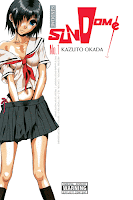 Sundome, Volumes 1-8 by Kazuto Okada. Another series that’s difficult to recommend to just anyone, Sundome is certainly deserving of it’s mature rating. I wasn’t actually that fond of the artwork overall, but it was effective in conveying certain elements of the story. Kurumi’s health problems, never fully explained, are certainly obvious from the beginning just by looking at her. The teens are portrayed as very sexual beings, which may bother some people, but I actually found the characters’ frankness regarding a wide variety of kinks and fetishes to be refreshing. There’s also a fair amount of humor. The exploration of Hideo and Kurumi’s relationship, something they both want and need, is fascinating and compelling.
Sundome, Volumes 1-8 by Kazuto Okada. Another series that’s difficult to recommend to just anyone, Sundome is certainly deserving of it’s mature rating. I wasn’t actually that fond of the artwork overall, but it was effective in conveying certain elements of the story. Kurumi’s health problems, never fully explained, are certainly obvious from the beginning just by looking at her. The teens are portrayed as very sexual beings, which may bother some people, but I actually found the characters’ frankness regarding a wide variety of kinks and fetishes to be refreshing. There’s also a fair amount of humor. The exploration of Hideo and Kurumi’s relationship, something they both want and need, is fascinating and compelling.
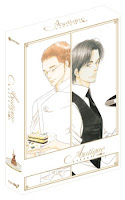 Antique Bakery directed by Yoshiaki Okumura. It’s been a while since I’ve read Fumi Yoshinaga’s manga series Antique Bakery. I’d forgotten how much I adored the characters, and the anime and voice actors capture them perfectly. I’d also forgotten how funny the series can be. The anime is only twelve episodes, so the story has been condensed and focuses mostly on the four main characters. It may be missing some of the sidestories, but it’s a lovely adaptation. The CG used for background and buildings unfortunately clashes terribly with the hand drawn elements, but I really like the color palette used. The music, featuring plenty of string ensembles, was also a wonderful fit.
Antique Bakery directed by Yoshiaki Okumura. It’s been a while since I’ve read Fumi Yoshinaga’s manga series Antique Bakery. I’d forgotten how much I adored the characters, and the anime and voice actors capture them perfectly. I’d also forgotten how funny the series can be. The anime is only twelve episodes, so the story has been condensed and focuses mostly on the four main characters. It may be missing some of the sidestories, but it’s a lovely adaptation. The CG used for background and buildings unfortunately clashes terribly with the hand drawn elements, but I really like the color palette used. The music, featuring plenty of string ensembles, was also a wonderful fit.
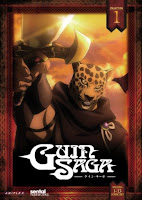 Guin Saga, Episodes 1-13 directed by Atsushi Wakabayashi. The Guin Saga anime adaptation is so incredibly epic and overly dramatic that it’s almost embarrassing, but I’m enjoying it immensely. The score is also suitably epic—but then I’d expect no less from Nobuo Uematsu. I’ve only read the first Guin Saga light novel, which takes up only three episodes of the anime, so I’m not sure how the adaptation compares to the original. But it it feels like the anime is only scratching the surface of a much deeper and more complex story. And there is an unfortunate tendency to pause in the middle of fight scenes to allow characters to make grand speeches. The animation is pretty, but perhaps too colorful for the story.
Guin Saga, Episodes 1-13 directed by Atsushi Wakabayashi. The Guin Saga anime adaptation is so incredibly epic and overly dramatic that it’s almost embarrassing, but I’m enjoying it immensely. The score is also suitably epic—but then I’d expect no less from Nobuo Uematsu. I’ve only read the first Guin Saga light novel, which takes up only three episodes of the anime, so I’m not sure how the adaptation compares to the original. But it it feels like the anime is only scratching the surface of a much deeper and more complex story. And there is an unfortunate tendency to pause in the middle of fight scenes to allow characters to make grand speeches. The animation is pretty, but perhaps too colorful for the story.

Speak Your Mind